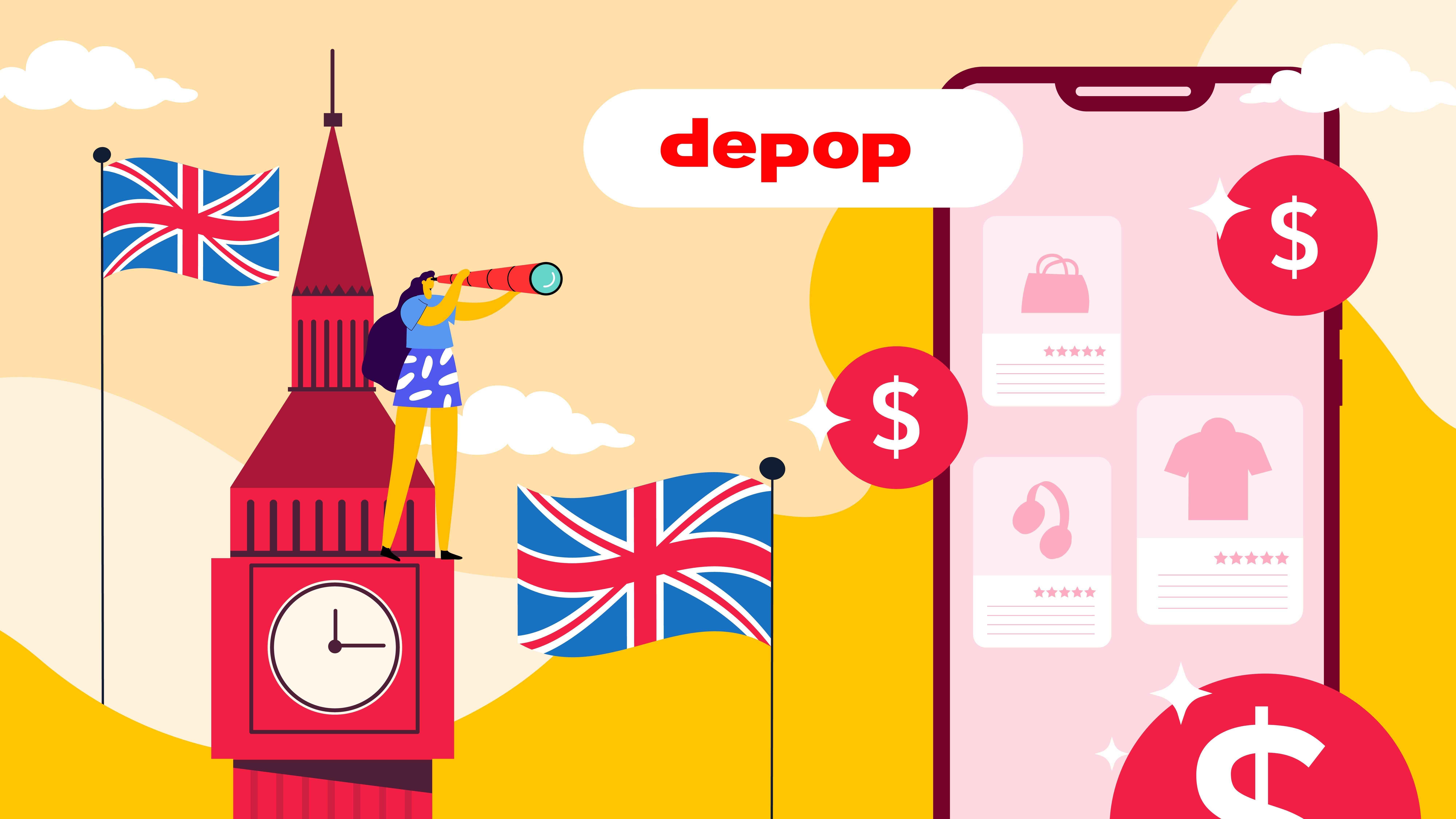As one of the best marketplaces for the young and the trendy, Depop has gained even more traction after saying goodbye to seller fees for UK users back in March 2024. Whether you’re listing your first item or looking to maximise your profits, understanding the remaining fees is essential.
In this guide, you’ll learn everything you need to know about Depop fees, from payment processing costs to the new marketplace fee for buyers. So, read on to discover how to stay ahead and keep your earnings in check.
Key Takeaways
- Depop restructured its UK fees in spring 2024, introducing a small marketplace fee for buyers and removing the 10% fee sellers previously paid.
- The new Depop marketplace fee for UK buyers is up to 5% + up to £1.
- UK sellers are still required to pay a transaction fee of 2.9% + £0.30 and may optionally pay an 8% boosted listing fee if they want to promote their items.
- You can maximise your earnings by pricing your items with these fees in mind, crosslisting to other marketplaces with Vendoo, using hashtags in item descriptions, and keeping your finances organised.
Depop Fees for UK Sellers
Depop’s fee structure includes various types of fees, and knowing which ones apply to you as a seller and how much you can actually expect to pay will help you price your items effectively. So, let’s take a closer look at Depop fees for sellers.
Depop Selling Fee
Depop removed its 10% fee for UK sellers in spring 2024. For all listings created from 20 March onwards, there is no selling fee. If you haven’t been active on the platform recently, check your inventory and make sure to refresh your older listings.
👀 Did you know that Vinted has zero selling fees, too? See our comparison article Compare Marketplaces: Selling on Vinted vs. Depop
Payment Processing Fee
All payouts for UK-based sellers are currently processed through Depop Payments, a payment system operated by Stripe. The processing fee is 2.9% charged on the total amount of the transaction (which is the item sale price plus postage and any applicable taxes) + £0.30.
Note: All Depop fees are typically refundable, and there are no additional refund charges. For more details on how refunds work, check out our article How to Refund on Depop: A Guide for Sellers.
Shipping Fee
Depop sellers in the UK can ship their items using Depop Shipping, powered by Evri, or arrange their own shipping method. Note that if you want to offer free shipping and pay the postage costs for the buyer, you can only do so through your own shipping method. Costs, in this case, may vary significantly based on the carrier and parcel size. If you expect the buyer to pay for postage, you can use a Depop Shipping label. As of October 2024, Depop Shipping costs are as follows:
- Small parcels (<1kg): £2.99
- Medium parcels (<2kg): £4.49
- Large parcels (<5kg): £6.49
You can always check the latest rates here.
Boosted Listing Fee (Optional)
Depop’s Boosted Listings feature helps sellers reach a wider audience by promoting their items in search results. When a buyer views, clicks, or likes your boosted item and makes a purchase within 28 days, you’ll be charged an 8% boosting fee on the item sale price (excluding taxes). Note that this fee applies to the sale price alone if you use a Depop Shipping label, or to both the sale price and shipping cost if you arrange your own shipping. If this sounds a bit confusing, don’t worry — you’ll see the exact amount you’ll have to pay based on the price of your item when setting up the Boosted Listing feature.
To learn more about boosting your profits on Depop, check out these 10 Ways to Increase Your Sales on Depop.
Depop Fees for UK Buyers
Depop’s recent fee policy change, which eliminated the 10% fee for sellers, introduced a new charge for buyers — the Depop marketplace fee. It’s applied to all UK purchases made after 20 March 2024 and is calculated based on the item purchase price, taxes and postage excluded. As of October 2024, buyers can expect to pay up to 5% of the item price + a fixed fee of up to £1. The exact amount will be shown during checkout.
Aside from the marketplace fee, UK buyers are responsible for taxes, postage costs (unless the seller offers free shipping), and, if buying from the seller outside the UK, customs or import fees, which can vary depending on the item price, package size, and the country of origin.

How to Calculate Depop Fees
Before the recent update in fee policy, you could use an online Depop fee calculator like the one by OmniProfit to get an accurate estimate of your profits from the sale. However, neither this one nor any other Depop fee calculator I checked has updated its formula to account for the selling fee removal. So, let’s do an example calculation for a typical Depop sale to help you understand how much you can make.
Depop Seller Fee Calculation Example
Suppose you sell a jumper for £20 and charge £2.99 for postage (via Evri). Here’s how your earnings are calculated:
- Item price: £20
- Buyer’s postage cost: £2.99
- Total paid by buyer: £20 + £2.99 = £22.99
- Processing fee (2.9% + £0.30): £22.99 x 0.029 + £0.30 = £0.97
- Your payout: £19.03
In case you make the same sale via a boosted listing, you’ll have one more fee, and hence, a lower payout:
- Boosted listing fee (8%): £20 x 0.08 = £1.6
- Your payout (with boosted listing): £17.43
💡Tip: Depop is not the only marketplace with no or minimal selling fees. You can crosslist your inventory to Depop, Vinted, Etsy, and others with Vendoo.
Tips for UK Sellers to Maximise Profits
While fees are part of the selling process on any platform, here are some things you can do to keep your Depop profits high even with fees:
- Revise your pricing strategy. While there’s no more need to price your items to account for Depop’s 10% selling fee, you may still want to factor in the transaction fee. Also, if some types of your items sell easily, you may try raising their prices, while those sitting in your closet for too long may benefit from a discount.
- Go smart about shipping. The price of boxes, envelopes, tape, and other packaging materials affects your profits, too. Look for ways to save on these expenses, such as reusing packaging (as long as it’s clean and in good condition) or sourcing materials affordably (e.g., buying in bulk or finding free materials at local stores).
- Post your listings across multiple platforms. Each marketplace has a distinct audience, so there’s no reason to stick to Depop only. With Vendoo, you can list your items to six selling platforms and manage them all in one place. Check the various plans available and start enjoying the benefits of crosslisting today.
- Refresh your listings. Relisting your items moves them to the top of the news feed, boosting their visibility and leading to more sales. Vendoo offers a convenient feature to automate this process.
- Use hashtags. Adding trending hashtags to your item descriptions is another way to increase exposure. The most relevant hashtags may be related to the style, brand, colour, or material of the item.
- Stay on top of your finances. You don’t want to let your receipts pile up and create a bookkeeping nightmare. Make sure to track platform fees, item costs, and shipping expenses so that it’s easier to calculate earnings and avoid losing profits due to bookkeeping mistakes. Vendoo’s business analytics dashboard can help you keep your finances organised.
You might also be interested in How to Become a Clothing Reseller: A Guide for UK Sellers.
Ready to take your reselling business to the next level?







